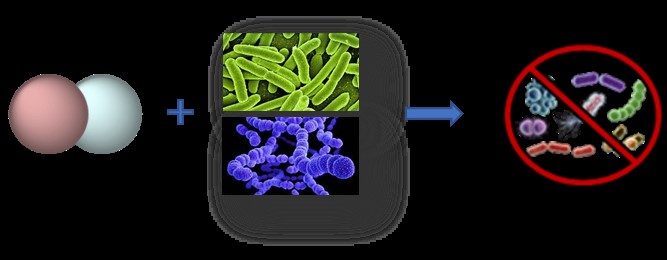RESEARCH PROGRAMMES
P3: Nanomedicine against cancer and infection
P4: Nanomagnetism and Critical Raw Materials
RESEARCH SUPERVISOR(S)
Dr Gorka Salas
Research Group website: https://nanociencia.imdea.org/magnetic-nanoparticles/group-home
Dr Begoña Sot
Research Group website: https://nanociencia.imdea.org/protein-engineering-and-nanobiotechnology/group-home
RESEARCH TOPIC DESCRIPTION
Antibiotic-resistant bacteria are a serious threat to public health and a global burden that is expected to get worse in the near future. To overcome this problem, there is an increasing necessity to design new antibacterial agents. One promising and innovative approach consists in the use of nanomaterials with antibacterial properties. These nanomaterials have proved effective not only against planktonic bacteria (in liquid), but also against bacterial biofilms, usually difficult to treat with classical antibiotics [1]. Furthermore, it is possible to combine materials with complementary properties in the same nanostructure to boost their antibacterial properties [2]. These new antibacterial compounds against resistant bacteria would have a great impact on society, decreasing the dependency on classical antibiotics and therefore avoiding the rise of new antibiotic-resistant bacteria strains.
The implementation of this research is focused on the preparation of nanomaterials based on metal and metal oxides that can display antimicrobial activity per se or in synergistic combination with antibacterial biomolecules. Different compositions that can provide combined additional properties (e. g. magnetic, optic) will be explored to create more efficient antibacterial compounds. The nanomaterials will be functionalized with antibacterial biomolecules and/or molecules able to directionalize the nanomaterial to target bacteria to obtain synergistic effects. The bactericidal activity of the nanomaterials against gram-positive and gram-negative bacteria will be tested on both planktonic and biofilm bacterial cultures.
[1] Biomater. Sci. 2020, 15, 6825-6839. DOI: 10.1039/d0bm00974a.
[2] Colloids Surf. B 2020, 194, 111178. DOI: 10.1016/j.colsurfb.2020.111178.
POSITION DESCRIPTION
A typical background would be in nanomaterials synthesis and characterization, functionalization of nanomaterials and bacterial cell culture. With experience in one or more of the following bottom-up synthesis of nanomaterials by chemical procedures; covalent surface functionalization with biomolecules; bacterial cell culture and efficiency measurements of antibacterial compounds (MIC and MBC determination); bacterial biofilm formation and measurement of antimicrobial efficacy against biofilms will be also highly valued.
The candidate will be accountable to the supervisors but is expected to conduct research independently and with self-motivation.
PARTNER ORGANIZATIONS
Secondments in research organizations, with research groups in hospitals and companies will be carried out. Some collaborators include: Ibane Abasolo (Vall d’Hebron, Barcelona), Manuel Desco (Unidad de Imagen Avanzada, Hospital Gregorio Marañón, Madrid), Biokeralty Research Institute (Vitoria-Gasteiz).

